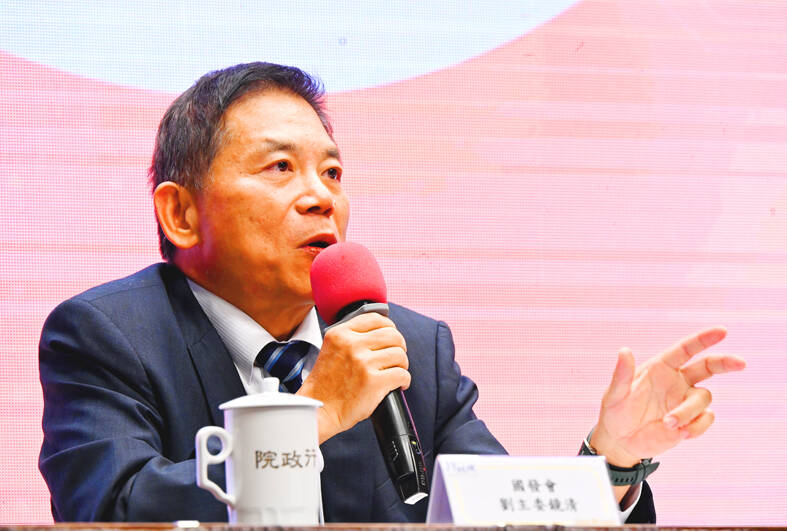The National Development Council (NDC) is to issue “digital nomad” visas for up to six months to attract global talent, NDC Minister Paul Liu (劉鏡清) said yesterday.
As the COVID-19 pandemic made remote working more common, the council is to target digital nomads, people who work remotely using technology, to boost the nation’s talent outreach, Liu said.
Southeastern countries are major labor exporters, but the government expects that by 2035, most people from those countries would stop seeking jobs overseas due to their increased income, he said.

Photo: Liu Hsin-de, Taipei Times
Attracting international talent has become even more important in these circumstances, he said, adding that countries such as Japan, South Korea and Thailand have already developed digital nomad policies.
Thailand’s Destination Thailand Visa, which came into effect on Monday, allows digital nomads to stay in the country for up to 180 days with five-year multiple entry permission.
South Korea this year implemented Workation Visa, which grants digital nomads a one-year stay that they can extend for another year.
Japan in March introduced a visa for digital nomads, allowing them to stay in the country for six month.
As Japan’s digital nomad visa is not extendable, Taiwan could take advantage of its proximity to Japan to attract people leaving the nation once Taiwan’s visa program is established, Liu said.
The government has been advertising the upcoming policy online in the UK and other palces, he added.
It is estimated that there are about 35 million digital nomads worldwide, he said.
Taiwan aims to retain 10 percent of its digital nomads, he said, adding that this would boost domestic tourism and the economy.
Currently, digital nomads travel to Taiwan visa-free or with a tourist visa that expires after three months, he said.
The council is to allow digital nomad visas that can be extended for three months, allowing a maximum six-month stay, Liu said.
The extension does not require legislative amendments and could be implemented once approved by the Ministry of Foreign Affairs, he added.
Meanwhile, to loosen restrictions on permanent residence for top-tier foreign talent, the council is to submit draft amendments to the Act for the Recruitment and Employment of Foreign Professionals (外國專業人才延攬及僱用法) to the Legislative Yuan for review during its next session, Liu said.
The bill would follow Japan’s example to launch a “global elite visa,” allowing foreign professionals with a minimum annual salary of at least NT$6 million (US$184,021) to be granted permanent residence at least one year after they arrive in Taiwan, he said.
The goal is to bring 120,000 foreign talents into Taiwan by 2028, which is expected to consist of 60,000 international professionals, 50,000 foreign and overseas compatriot students and 10,000 digital nomads, he added.

INVESTIGATION: The case is the latest instance of a DPP figure being implicated in an espionage network accused of allegedly leaking information to Chinese intelligence Democratic Progressive Party (DPP) member Ho Jen-chieh (何仁傑) was detained and held incommunicado yesterday on suspicion of spying for China during his tenure as assistant to then-minister of foreign affairs Joseph Wu (吳釗燮). The Taipei District Prosecutors’ Office said Ho was implicated during its investigation into alleged spying activities by former Presidential Office consultant Wu Shang-yu (吳尚雨). Prosecutors said there is reason to believe Ho breached the National Security Act (國家安全法) by leaking classified Ministry of Foreign Affairs information to Chinese intelligence. Following interrogation, prosecutors petitioned the Taipei District Court to detain Ho, citing concerns over potential collusion or tampering of evidence. The

‘FORM OF PROTEST’: The German Institute Taipei said it was ‘shocked’ to see Nazi symbolism used in connection with political aims as it condemned the incident Sung Chien-liang (宋建樑), who led efforts to recall Democratic Progressive Party (DPP) Legislator Lee Kun-cheng (李坤城), was released on bail of NT$80,000 yesterday amid an outcry over a Nazi armband he wore to questioning the night before. Sung arrived at the New Taipei City District Prosecutors’ Office for questioning in a recall petition forgery case on Tuesday night wearing a red armband bearing a swastika, carrying a copy of Adolf Hitler’s Mein Kampf and giving a Nazi salute. Sung left the building at 1:15am without the armband and apparently covering the book with a coat. This is a serious international scandal and Chinese

Seventy percent of middle and elementary schools now conduct English classes entirely in English, the Ministry of Education said, as it encourages schools nationwide to adopt this practice Minister of Education (MOE) Cheng Ying-yao (鄭英耀) is scheduled to present a report on the government’s bilingual education policy to the Legislative Yuan’s Education and Culture Committee today. The report would outline strategies aimed at expanding access to education, reducing regional disparities and improving talent cultivation. Implementation of bilingual education policies has varied across local governments, occasionally drawing public criticism. For example, some schools have required teachers of non-English subjects to pass English proficiency

TRADE: The premier pledged safeguards on ‘Made in Taiwan’ labeling, anti-dumping measures and stricter export controls to strengthen its position in trade talks Products labeled “made in Taiwan” must be genuinely made in Taiwan, Premier Cho Jung-tai (卓榮泰) said yesterday, vowing to enforce strict safeguards against “origin laundering” and initiate anti-dumping investigations to prevent China dumping its products in Taiwan. Cho made the remarks in a discussion session with representatives from industries in Kaohsiung. In response to the US government’s recent announcement of “reciprocal” tariffs on its trading partners, President William Lai (賴清德) and Cho last week began a series of consultations with industry leaders nationwide to gather feedback and address concerns. Taiwanese and US officials held a videoconference on Friday evening to discuss the